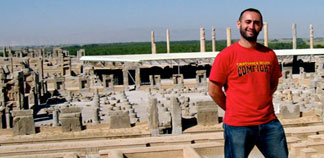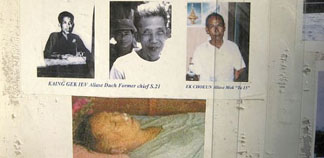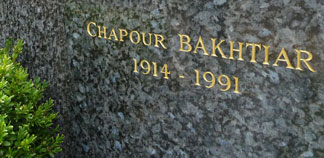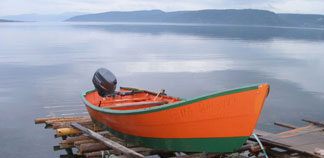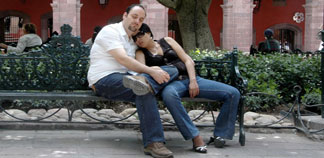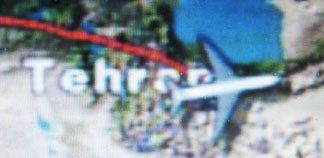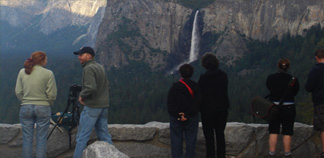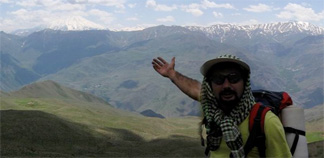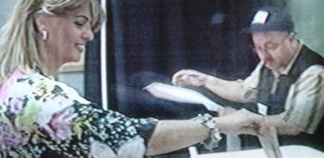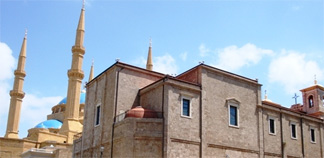به زبان فارسی
PICTORY
LATEST MUSIC
SEARCH
NASAL
03-Aug-2009 (4 comments)
My grandmother had a big nose. In some ways, she was a big nose that happened to have a body attached to it. Her nose was far bigger than Shruti Haasan’s nose. The actress’s former nose, that is. Even with surgery – and then more surgery – my grandmother’s nose would be bigger than Ms Haasan’s former nose. “I had a medical condition that restricted free breathing,” the 23-year-old told this paper the other week. “Now, post the surgery, I can finally sleep in peace and it has also enhanced my vocal skills. The said condition is called a deviated septum – the reason Ranbir Kapoor's parents are reportedly nudging him to go under the knife. The actor, however, is refusing to budge (or, at least, his nose is). According to bloggers, he's happy with his “crooked” piece and doesn’t need a “straight” one>>>
REVIEW
19-Jul-2009 (2 comments)
Bahman Maghsoudlou's "Grass: Untold Stories" not only tells the story of the film Grass, the pioneer 1924 still-documentary on the migration of the Bakhtiari tribe from their summer to winter quarters in Southwest Iran, but also the lives of three American adventurers who made the film. The book describes, in detail, and on the basis of a variety of sources, including the memoirs and books written by the three Americans adventurers, their life experiences, most importantly, their unusual adventure in making the film Grass. The first half of the book deals with their lives before leaving for Iran and the second their extraordinary adventure with the Bakhtiari migration>>>
EYEWITNESS
29-Jun-2009 (29 comments)
یک هفته قبل از انتخابات رفتم ایران. سالها بود که در ایران سوار قطار نشده بودم. در واقع از چند سال قبل از انقلاب که بچه بودم و همراه مادرم چندین بار با قطار از آبادان که محل تولد و زندگی من بود به تهران رفتیم و برگشتیم. البته آبادان که ایستگاه قطار نداشت، باید میرفتیم خرمشهر که چسبیده به آبادان بود. حالا بعد سالها دوباره در ایران با قطار مسافرت میکردم. مدتهاست به خودم یاد داده ام که مقایسه نکنم. مخصوصاً مقایسه چیزهایی که میبینم و تجربه میکنم در ایران با سوییس. این یک قیاس مع الفارق است و اصلاً جایش نیست. چون غیر از ناراحتی و عذاب چیزی عاید نمیشود. سعی میکنم که هر چیز را با شرایط محیط خودش و امکاناتش مقایسه کنم تا کمتر غصه بخورم. بگذریم که در این حالت هم کم نیست شرایطی که غمم میگیرد.>>>
UK & IRAN
11-Jun-2009 (4 comments)
Earlier that day the BBC reported that a “far right, anti-immigrant” party in the UK – a Nazi party in all but name – had won two seats in the European parliament – there were pictures of its fascist leader laughing in victory, not unlike King Cockroach in my apartment. Then there was news of elections in the Islamic Republic of Iran. Its president – as outspoken as he is reactionary – has been locking horns (or antennae) with an ever-so-slightly less reactionary leader whose wife, dubbed the Michelle Obama of Iran, a veiled version, of course, has been helping him along in his campaign>>>
OBSERVER
05-Jun-2009
The Lebanese will go to the polls on Sunday, June 7, to elect 128 members of parliament, divided equally between the country’s Christian and Moslem communities, each of which include a variety of sects. The Speaker of Parliament is a Shia Moslem, while the President is a Christian and the Prime Minister a Sunni Moslem. The cabinet is also meant to reflect the country’s diversity, which may appear to be religious, but is in fact based on a more complex set of factors, including ethnicity, geographic location, local economy and ties with other countries in the region and beyond. This year, for the first time, elections will be held on one day>>>
RECENT COMMENTS
IRANIANS OF THE DAY
| Person | About | Day |
|---|---|---|
| نسرین ستوده: زندانی روز | Dec 04 | |
| Saeed Malekpour: Prisoner of the day | Lawyer says death sentence suspended | Dec 03 |
| Majid Tavakoli: Prisoner of the day | Iterview with mother | Dec 02 |
| احسان نراقی: جامعه شناس و نویسنده ۱۳۰۵-۱۳۹۱ | Dec 02 | |
| Nasrin Sotoudeh: Prisoner of the day | 46 days on hunger strike | Dec 01 |
| Nasrin Sotoudeh: Graffiti | In Barcelona | Nov 30 |
| گوهر عشقی: مادر ستار بهشتی | Nov 30 | |
| Abdollah Momeni: Prisoner of the day | Activist denied leave and family visits for 1.5 years | Nov 30 |
| محمد کلالی: یکی از حمله کنندگان به سفارت ایران در برلین | Nov 29 | |
| Habibollah Golparipour: Prisoner of the day | Kurdish Activist on Death Row | Nov 28 |


